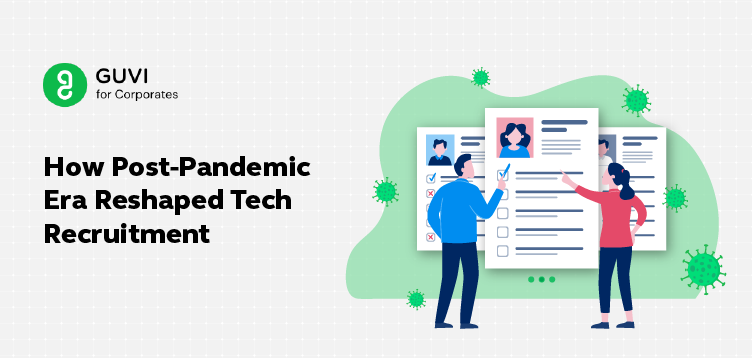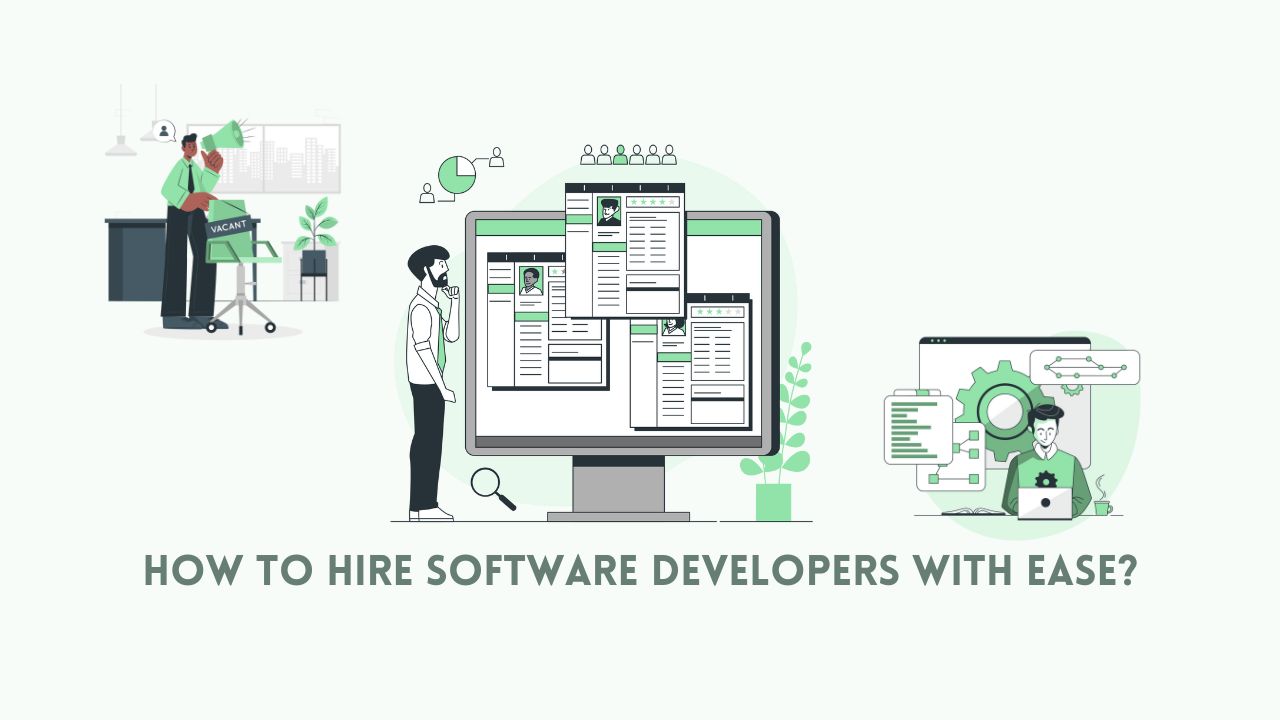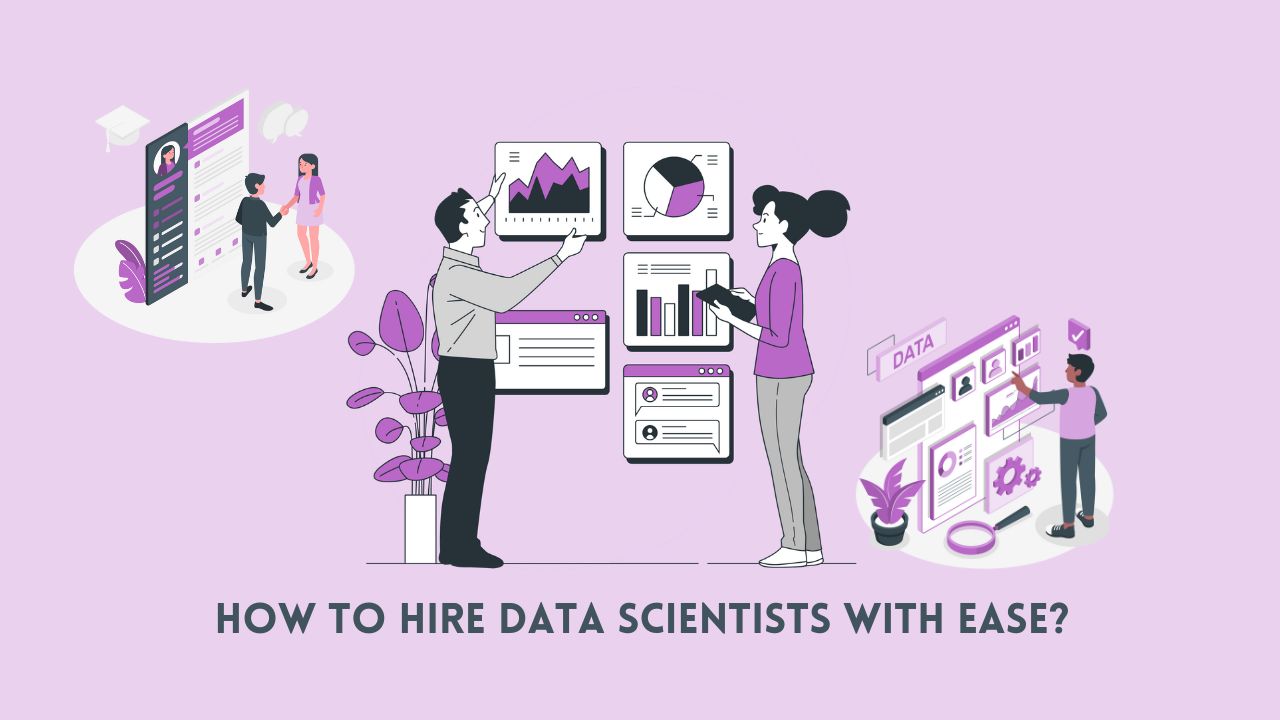
How Post-Pandemic Era Reshaped Tech Recruitment
Sep 04, 2024 5 Min Read 2305 Views
(Last Updated)
In recent years, to be more specific, starting from the year 2020, there have been numerous advancements in the tech industry. As businesses adapt to the new normal technologies, the demand for skilled tech professionals is higher than ever. The tech industry has seen millions of transformations, and so does tech recruitment.
In this blog, we will dive deep into the intricacies of tech recruitment transformations in the post-pandemic era, exploring the evolving importance of technical skills, how organizations have evolved to secure the right talent, and the challenges and opportunities of hiring in this dynamic environment.
Table of contents
- Demand for Technical Skills in the Post-pandemic Era
- Tech Recruitment Transformations in the Post-Pandemic Era
- Remote Hiring Dynamics
- Adapting to Virtual Onboarding
- Emphasis on Soft Skills
- Diversity and Inclusion in Tech
- Rise of Freelance Gigs
- Data-Driven Recruitment Strategies
- Employing AI in the Recruitment Processes
- Continuous Learning and Development
- Optimize your Tech-Hiring with HYRE
- Wrapping Up
- FAQs
- How has remote work impacted tech recruitment practices?
- What are the primarily considered skills in tech recruitment post-pandemic?
- Why should I use AI-powered tools in the tech hiring process?
- Is the Hyre tool easy to use?
- What are the challenges associated with remote hiring in the tech industry?
Demand for Technical Skills in the Post-pandemic Era
In the post-pandemic tech landscape, the importance of technical skills has spiked high. More than ever, top employers are seeking candidates with diverse technical expertise to drive innovation and stay competitive. As businesses increasingly rely on technology, a workforce equipped with the right technical talents becomes indispensable.
Technical skills encompass a wide array of capabilities, ranging from programming languages to data analysis. In a post-pandemic world, where remote work and digital transformation are the top concerns, individuals with technical expertise become the core of an organization’s success.
Enrolling in GUVI’s Digital Marketing course can help you become an expert in the digital world, regardless of your level of marketing expertise. Learn the ins and outs of email marketing, social media marketing, content production, SEO, and more from professionals in the field. Through practical projects and real-world case studies, acquire job-ready skills with globally recognized certifications.
Additionally, if you want to explore Marketing Research Techniques through a Self-paced course, try GUVI’s Marketing Research Techniques Self-Paced certification course.
Technical skill upgrade also applies to advancing your existing workforce. This is where upskilling programs and corporate training come into play. Corporate training programs play a key role in upskilling existing employees and ensuring they remain abreast of the latest technological advancements.
Read More: 10 Best Corporate Training Programs for Employees in 2023
Tech Recruitment Transformations in the Post-Pandemic Era
Businesses have recalibrated their recruitment strategies to adapt to the post-pandemic era. In this exploration, we delve into the key facets of this transformation, the innovative strategies adopted in the new tech hiring processes, and the overarching impact on the industry.
Remote Hiring Dynamics
The remote work culture has revolutionized the post-pandemic hiring process. The shift from conventional to remote work has paved the way for businesses to adopt the virtual nature of hiring. Traditional in-person interviews have been replaced by virtual interviews conducted via video conferencing platforms like Zoom, Microsoft Teams, Webex, Google Meet, and more.
On a wider scale, Organizations conduct technical skill assessments through a dedicated tool that evaluates a candidate’s expertise through online hands-on tasks or written tests.

Adapting to Virtual Onboarding
Online assessments and video interviews have become crucial, ensuring a seamless recruitment process despite geographical barriers.
With remote work extending to onboarding processes, organizations are redefining their approaches to integrate new hires seamlessly. Virtual onboarding, equipped with comprehensive training modules, ensures that employees are well-acquainted with company culture and job responsibilities, setting the stage for a successful integration.
Companies are now navigating the challenges of assessing and onboarding candidates virtually. Employers are now recalibrating their recruitment strategies to assess candidates effectively in advanced virtual environments.
Emphasis on Soft Skills
Beyond technical expertise, the post-pandemic era emphasizes the significance of soft skills. Collaboration, communication, team management, and adaptability are now key factors in a remote or hybrid work environment. Employers are incorporating assessments that evaluate technical and soft skills to build well-rounded teams.
Few online assessment tools include separate templates for behavioral assessment tests and soft skills tests to measure the soft skills possessed by a potential candidate.
Diversity and Inclusion in Tech
The post-pandemic era has spotlighted diversity and inclusion in the tech industry. Companies are recognizing the value of diverse perspectives and implementing inclusive hiring practices encouraging upskilling for candidates like women who took career breaks, people who wish to switch career streams, and more to foster innovation and equality.
Rise of Freelance Gigs
The tech industry is increasingly opting for freelance or contract workers, post-pandemic. Employers are adapting to this interesting shift by integrating freelancers into their workforce, capitalizing on the flexibility and specialized skills they bring to the organization.

The economic uncertainties that arose after the pandemic prompted organizations to reevaluate their cost structures. Freelancers, often engaged on a project basis, offer a cost-efficient alternative to traditional full-time hires. Companies could scale their workforce up or down based on project demands, avoiding the financial commitments associated with permanent staffing.
Data-Driven Recruitment Strategies
Leveraging data analytics in recruitment has become indispensable post-pandemic. Employers are utilizing data to identify trends, assess the effectiveness of their recruitment strategies, and make informed decisions to optimize the hiring process.
Employing AI in the Recruitment Processes
Artificial Intelligence is playing a crucial role in streamlining the recruitment process. Modern tech recruitments utilize AI-powered algorithms for the vast amount of resume screening. They analyze resumes, identify relevant skills and experience, and match candidates to job requirements with incredible speed and precision.
This not only accelerates the initial screening phase but also ensures a more comprehensive evaluation of potential candidates. AI delves into predictive analytics to assess a candidate’s potential success rate in a role. By analyzing historical data on the performance of past hires, AI systems can predict which candidates are more likely to excel in specific positions. This data-driven approach enhances decision-making and reduces the risk of mismatched hires.
From AI-powered assessment tools to predictive analytics for candidate success, AI is automating repetitive tasks, enabling recruiters to focus on more strategic aspects of talent acquisition.
Continuous Learning and Development
In the tech industry, where innovations occur rapidly, continuous learning is inevitable. Tech employers often struggle to find candidates with the latest and most relevant skills. Continuous learning & development help bridge this gap, enabling professionals to adapt and thrive in the rapidly changing tech landscape.
Also, job aspirants are more inclined to join organizations that prioritize the professional growth of their employees. Companies that offer learning & development opportunities tend to attract and retain top tech talent.
Continuous learning & development is the biggest competitive advantage in the tech hiring process post-pandemic. Companies can enjoy a skilled workforce with certified employees. On the other hand, companies that invest in their employees’ learning & development are more likely to succeed in today’s dynamic and highly competitive industry.
Also Read: The Role of Continuous Learning in Tech Hiring
Optimize your Tech-Hiring with HYRE
To streamline the recruitment process, companies can employ new acquisition technologies that enable your business to hire more seamlessly, rapidly, and effectively. Smart Assessment tools help conduct bias-free, efficient, and time-saving assessments for recruitment. Businesses can measure to compare the skills of the candidates and find the best tech fit specific to their business needs with ease.
If you are looking for such an all-rounder tool, explore HYRE, a 360-degree, AI-powered assessment tool by GUVI for corporates. HYRE comes with a pre-structured assessment pipeline – a seamless end-to-end recruitment process & competency screening tool that filters the best candidates by conducting regular assessments, HR screening calls & technical interviews. This is trackable using a structured assessment pipeline so you don’t miss out on anything.
It has a great library with questionnaire templates with customizable difficulty levels for individual job roles. It enables you to schedule tests at the preferred time and date according to your Organization’s convenience. You can also automate tests and send them to any number of candidates at a set date, time, and event.
HYRE streamlines the proctoring & evaluation process involved in talent acquisition, making the job easy for recruiters. You can also track your efforts through an all-in-one dashboard. This analytical space helps to get time-to-time, instantaneous reports, and keep your metrics in check, including metrics like:
- Total number of candidates
- Candidates who appeared for the test
- Number of candidates hired for the role
- Number of tests that ran successfully
- Templates employed, and more.
With HYRE, You can monitor candidates’ performance and detect suspicious activities like copy-paste, tab switch, idle movements, unusual responses, etc. Record your candidates’ performances in video snippets. Review them later when you interview the candidate or if needed. This way, you can understand the genuineness of the candidate and avoid misconduct or any suspicious activities during the assessment.
AI-based video surveillance of HYRE is a time-saving and efficient way to ensure productivity in the recruitment process. This feature enables you to automatically detect abnormal movements, unusual occurrences, malpractice, or any mishaps during the assessment sessions.
The applicant tracking system in HYRE streamlines your recruiting process, filters out the candidates, and drives you toward the right fit for your organization. This feature serves as a control hub for candidate management and reduces your cost-per-hire as well.
Also, With GUVI’s hiring services, Businesses can save up to 70% on their cost-per-acquisition, fasten their pre-employment screening, and hire trained freshers, or mid-to-senior level seasoned tech candidates with strong technical and communication skills at a reasonable cost.
Join GUVI’s Digital Marketing Career Program to kickstart your journey in this exciting field. Gain expertise in ChatGPT, WordPress, Meta Business Suite, Google Analytics, Youtube Analytics, Google Ads Manager, and more. Master essential skills in SEO, social media marketing, email marketing, content creation, and digital advertising tactics to excel in the Digital Marketing industry. Additionally, if you want to explore Marketing Research Techniques through a Self-paced course, try GUVI’s Marketing Research Techniques Self-Paced certification course.
Wrapping Up
Tech recruitment has consistently flourished, post-pandemic. It was a mere necessity rather than a choice for tech industries. The tech landscape has increased its focus on technical skills, soft skills, the remote nature of working, scaling the workforce, the strategic cultivation of talent pipelines, emphasis on diversity, and data-driven decision-making.
AI has changed the perspectives of tech hiring for many organizations across the world. Remote jobs and freelance gigs are recognized and seen as more rewarding than ever before by the candidates. As the industry continues to evolve, the resilience and dynamism of the tech workforce stand as a testament to its ability to thrive in the face of challenges.
We’ve discussed powerful transformations that occurred in tech recruitment post-pandemic in this blog and hope you find it insightful for your business. Share with us about how you tackle post-pandemic tech recruitment in the comments below.
FAQs
Remote work has led to the acquisition of a broader talent pool, allowing companies to hire from different geographical locations. Tech recruiters are leveraging virtual collaboration tools and platforms to conduct interviews, assessments, and onboarding processes by cutting down costs.
Adaptability, digital literacy, and strong communication skills are considered primary in tech-recruitment, post-pandemic.
AI-powered tools like GUVI’s HYRE can help match resumes to job descriptions, making it easier to identify qualified candidates quickly. This saves a lot of company time, resources, and cost while making the entire hiring process extremely efficient and fast.
Hyre tool is easy to use and involves very little admin intervention after setup. You can send timely emails to candidates and track all your efforts with the all-in-one smart dashboard.
Challenges include effective in-person communication and collaboration, time zone differences, potential isolation and loneliness for remote tech professionals, cybersecurity concerns, lack of team energy, and the need to assess technical skills remotely.























![Top Interviewing Techniques for Technical Skill Assessment [2025] 6 technical skill assessment](https://www.guvi.in/blog/wp-content/uploads/2023/11/technical_skills_assessment.webp)



![Measuring ROI on Tech Talent Acquisition: Strategies and Best Practices [2025] 10 Feature image - Measuring ROI on Tech Talent Acquisition Strategies and Best Practices](https://www.guvi.in/blog/wp-content/uploads/2024/01/Feature-image-Measuring-ROI-on-Tech-Talent-Acquisition-Strategies-and-Best-Practices.webp)



Did you enjoy this article?